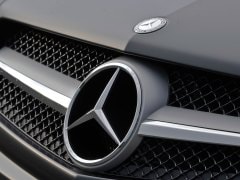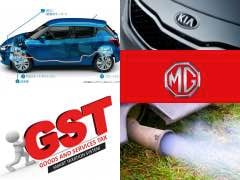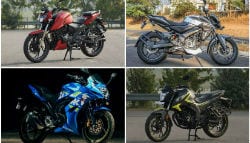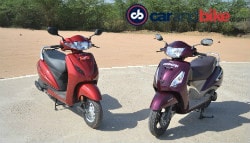What Auto Companies Will Need To Do To Be BS VI Ready
car&bike Team
1 min read
Mar 31, 2017, 03:18 PM

Key Highlights
- BS VI norms will come into effect in India in 2020
- The country will skip the BS V norms entirely
- Auto companies will need to make significant investments in technology
With the Supreme Court ordering the ban of sale of BS III vehicles in India from the 1st of April 2017, automobile manufacturers are looking for solutions which might help them face the least amount of financial setback. We've already told you all there is to know about the ban, we've also given you a detailed report as to how the industry reacted to this situation. While some might think that it was a drastic step, the order sent out by the Supreme Court clearly states that the decision has put health of citizens before financial gain.
Considering that India has the most polluted cities in the world and 30 Indian cities figure in the Top 100 Most Polluted Global Cities (in terms of particulate matter PM10) as per data published by World Health Organization in May 2016, we can understand the severity of the problem and hence this decision is certainly a welcome one. While the implementation of BS IV was one that was foreseen, India will be frog leaping BS V norms and adopting BS 6 norms by 2020 and this will mean a significant amount of investment for the OEMs as also the component manufacturers.
To give you a background about the emission norms in India, they were first enforced for petrol vehicles in 1991 and for diesel vehicles in 1992. These were further tightened in 1996 with the compulsory fitment of catalytic converters in petrol cars. Bharat Stage emission norms were first introduced in the year 2000 and these specify the maximum permissible emission limit for carbon monoxide (CO), hydrocarbons (HC), nitrous oxides (NOx) and particulate matter (PM). Now it was first envisaged that BS 3 norms will be rolled out by 2017, BS 5 by 2021 and BS 6 by 2024, however, the Union government thought otherwise and as we've said earlier, India will be skipping BS V entirely and move straight on to BS VI by 2020. What this move will do is bring down both level of both NOx and Particulate matter.
But to make its cars BS 6 ready, OEMs will be seen upgrading their engine technology and this means there'll be significant investments made in the next couple of years. Transitioning to BS-VI norms will require significant engine technology and this will mean there will have to be improvements made in engine combustion and even engine calibration will play an important role. The pressures on injection and cylinder will also need to be increased and NOx and PM after-treatment solutions will need to be laid out.
Typically, two engine fitments will need upgradation and this includes Diesel Particulate Filter (DPF)- which will help reduce PM in diesel vehicles and Selective Catalytic Reduction (SCR) Module - For reduction in NOx emissions. It's this upgradation that will be at the centre of both cost and technological innovation for the next couple of years and it's where most of the investment will be pumped into.
We expect the prices of petrol cars to soar by Rs. 25,000-30,000 while the diesels will get dearer by probably Rs. 80000 to Rs. 1 lakh. Given the disparity in the prices of petrol and diesel now, this sort of major hike will certainly see demand for diesel cars going down significantly. The low demand will certainly harm OEMs like Mahindra, Tata, Skoda, Volkswagen and even Hyundai who boast of a strong market share in diesel cars. Auto component manufacturers with strong dependence on diesel cars too will be hit severely.
So, yes, there is a significant amount that needs to be invested into making cars BS VI ready and an estimate of over $10 billion might be invested by automobile a and auto component manufacturers to manufacture BS VI compliant vehicles. The next three years, hence, will be extremely crucial as companies start to make BS VI specific components and this means a lot of changes in engine electronics. ECUs will be required for monitoring the increasing complexity in the engine and measuring the emissions on a real-time basis.
There will be additions made the new engine and even the exhaust and this means that the complexity and electronic dependency will be higher which brings us to a big problem of servicing. While we can still depend on a few neighbourhood service centres to fix the car, the complex electronics of the engine will need a service centre which comes equipped to the hilt with diagnostic machines and this could probably see a few of them going out of business
In the next few years we will see the shift to hybrid and electric vehicles as alternatives to petrol and diesel. Plug-in Hybrids in fact are already making their way into the country and with global manufacturers like Mercedes-Benz, Audi and BMW already planning a whole lot of hybrids and electric cars by 2021, we are sure to see them make an entry into India in the next decade.
While automobile manufacturers would have preferred the BS VI norms to make its way into the country by 2024, it seems like, they're now left with no option. While it's a challenge for auto manufacturers to make certain that they stick to the 2020 deadline, what will prove to be a Herculian task is keeping the price of the vehicles under check and provide consumers with cars they'll still be able to afford.
Considering that India has the most polluted cities in the world and 30 Indian cities figure in the Top 100 Most Polluted Global Cities (in terms of particulate matter PM10) as per data published by World Health Organization in May 2016, we can understand the severity of the problem and hence this decision is certainly a welcome one. While the implementation of BS IV was one that was foreseen, India will be frog leaping BS V norms and adopting BS 6 norms by 2020 and this will mean a significant amount of investment for the OEMs as also the component manufacturers.
To give you a background about the emission norms in India, they were first enforced for petrol vehicles in 1991 and for diesel vehicles in 1992. These were further tightened in 1996 with the compulsory fitment of catalytic converters in petrol cars. Bharat Stage emission norms were first introduced in the year 2000 and these specify the maximum permissible emission limit for carbon monoxide (CO), hydrocarbons (HC), nitrous oxides (NOx) and particulate matter (PM). Now it was first envisaged that BS 3 norms will be rolled out by 2017, BS 5 by 2021 and BS 6 by 2024, however, the Union government thought otherwise and as we've said earlier, India will be skipping BS V entirely and move straight on to BS VI by 2020. What this move will do is bring down both level of both NOx and Particulate matter.
But to make its cars BS 6 ready, OEMs will be seen upgrading their engine technology and this means there'll be significant investments made in the next couple of years. Transitioning to BS-VI norms will require significant engine technology and this will mean there will have to be improvements made in engine combustion and even engine calibration will play an important role. The pressures on injection and cylinder will also need to be increased and NOx and PM after-treatment solutions will need to be laid out.
Typically, two engine fitments will need upgradation and this includes Diesel Particulate Filter (DPF)- which will help reduce PM in diesel vehicles and Selective Catalytic Reduction (SCR) Module - For reduction in NOx emissions. It's this upgradation that will be at the centre of both cost and technological innovation for the next couple of years and it's where most of the investment will be pumped into.
We expect the prices of petrol cars to soar by Rs. 25,000-30,000 while the diesels will get dearer by probably Rs. 80000 to Rs. 1 lakh. Given the disparity in the prices of petrol and diesel now, this sort of major hike will certainly see demand for diesel cars going down significantly. The low demand will certainly harm OEMs like Mahindra, Tata, Skoda, Volkswagen and even Hyundai who boast of a strong market share in diesel cars. Auto component manufacturers with strong dependence on diesel cars too will be hit severely.
So, yes, there is a significant amount that needs to be invested into making cars BS VI ready and an estimate of over $10 billion might be invested by automobile a and auto component manufacturers to manufacture BS VI compliant vehicles. The next three years, hence, will be extremely crucial as companies start to make BS VI specific components and this means a lot of changes in engine electronics. ECUs will be required for monitoring the increasing complexity in the engine and measuring the emissions on a real-time basis.
There will be additions made the new engine and even the exhaust and this means that the complexity and electronic dependency will be higher which brings us to a big problem of servicing. While we can still depend on a few neighbourhood service centres to fix the car, the complex electronics of the engine will need a service centre which comes equipped to the hilt with diagnostic machines and this could probably see a few of them going out of business
In the next few years we will see the shift to hybrid and electric vehicles as alternatives to petrol and diesel. Plug-in Hybrids in fact are already making their way into the country and with global manufacturers like Mercedes-Benz, Audi and BMW already planning a whole lot of hybrids and electric cars by 2021, we are sure to see them make an entry into India in the next decade.
While automobile manufacturers would have preferred the BS VI norms to make its way into the country by 2024, it seems like, they're now left with no option. While it's a challenge for auto manufacturers to make certain that they stick to the 2020 deadline, what will prove to be a Herculian task is keeping the price of the vehicles under check and provide consumers with cars they'll still be able to afford.
Latest News
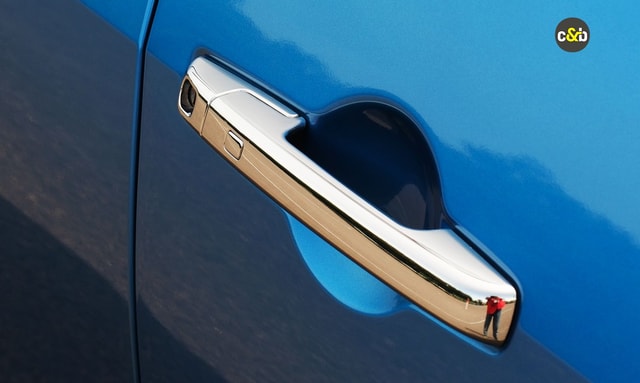 car&bike Team | Feb 3, 2026China Mandates Fitting of Mechanical Door Handles On New Cars From 2027Vehicles already on sale to be given an additional 2 years to conform to the new norms.1 min read
car&bike Team | Feb 3, 2026China Mandates Fitting of Mechanical Door Handles On New Cars From 2027Vehicles already on sale to be given an additional 2 years to conform to the new norms.1 min read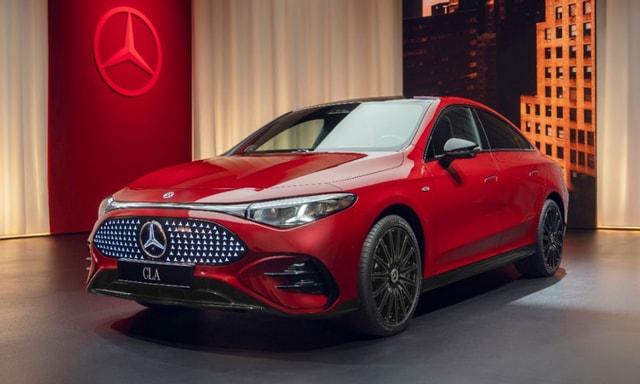 car&bike Team | Feb 3, 2026Mercedes-Benz CLA EV India Debut In April 2026The new-gen CLA, in its all-electric avatar, was globally unveiled in March 2025.1 min read
car&bike Team | Feb 3, 2026Mercedes-Benz CLA EV India Debut In April 2026The new-gen CLA, in its all-electric avatar, was globally unveiled in March 2025.1 min read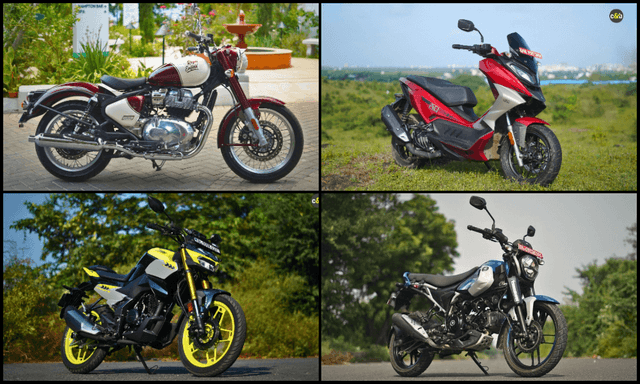 car&bike Team | Feb 3, 2026Two-Wheeler Sales January 2026: Hero MotoCorp, TVS, Royal Enfield, Suzuki Report Sustained GrowthMost brands have reported year-on-year growth in the first month of CY26.4 mins read
car&bike Team | Feb 3, 2026Two-Wheeler Sales January 2026: Hero MotoCorp, TVS, Royal Enfield, Suzuki Report Sustained GrowthMost brands have reported year-on-year growth in the first month of CY26.4 mins read car&bike Team | Feb 2, 2026Car Sales January 2026: Six Marutis in Top 10, But Tata Nexon Takes Top SpotTata Motors sold 23,365 units of the Nexon, creating a clear gap to the Maruti Suzuki Dzire, which finished second with 19,629 units.1 min read
car&bike Team | Feb 2, 2026Car Sales January 2026: Six Marutis in Top 10, But Tata Nexon Takes Top SpotTata Motors sold 23,365 units of the Nexon, creating a clear gap to the Maruti Suzuki Dzire, which finished second with 19,629 units.1 min read car&bike Team | Feb 2, 2026Maruti Suzuki Victoris Crosses 50,000 Sales Milestone In 4 monthsThe compact SUV launched at the onset of festive season has crossed the 50,000 sales mark in about 4 months1 min read
car&bike Team | Feb 2, 2026Maruti Suzuki Victoris Crosses 50,000 Sales Milestone In 4 monthsThe compact SUV launched at the onset of festive season has crossed the 50,000 sales mark in about 4 months1 min read car&bike Team | Feb 2, 2026Maruti Suzuki Announces Price Protection Amid Long Waiting PeriodsCountry’s largest carmaker has said that prices of the cars will not be increased for customers who have already made the bookings1 min read
car&bike Team | Feb 2, 2026Maruti Suzuki Announces Price Protection Amid Long Waiting PeriodsCountry’s largest carmaker has said that prices of the cars will not be increased for customers who have already made the bookings1 min read
 Preetam Bora | Feb 2, 2026TVS NTorq 150 Road Test Review: Bigger, Better & More Efficient!We test the new TVS NTorq 150 out in the real world to get a sense of what it offers in terms of performance, dynamics and fuel economy.7 mins read
Preetam Bora | Feb 2, 2026TVS NTorq 150 Road Test Review: Bigger, Better & More Efficient!We test the new TVS NTorq 150 out in the real world to get a sense of what it offers in terms of performance, dynamics and fuel economy.7 mins read Bilal Firfiray | Jan 21, 2026Tata Punch Facelift Review: New Turbo Engine; Same Old SoulWith the update, the Tata Punch facelift retains its character of being a healthy runabout, which is perfect for Indian roads. But have these changes made it any better?7 mins read
Bilal Firfiray | Jan 21, 2026Tata Punch Facelift Review: New Turbo Engine; Same Old SoulWith the update, the Tata Punch facelift retains its character of being a healthy runabout, which is perfect for Indian roads. But have these changes made it any better?7 mins read Amaan Ahmed | Jan 17, 2026Bajaj Chetak C25 First Ride Review: Basic, Likeable E-Scooter For First-Time RidersThe Chetak C25, in quite a few ways, is poles apart from the larger and more powerful 30 and 35 Series models, but in its mannerisms, it is very much a Chetak.8 mins read
Amaan Ahmed | Jan 17, 2026Bajaj Chetak C25 First Ride Review: Basic, Likeable E-Scooter For First-Time RidersThe Chetak C25, in quite a few ways, is poles apart from the larger and more powerful 30 and 35 Series models, but in its mannerisms, it is very much a Chetak.8 mins read Bilal Firfiray | Jan 9, 2026Toyota Urban Cruiser Hyryder: 10,000 km Long-Term ReviewAfter spending over three months and 10,000 km with the Toyota Urban Cruiser Hyryder Hybrid, we were impressed by its real-world mileage, seamless hybrid, practical comfort, and Toyota reliability. Is it the best C-SUV then?5 mins read
Bilal Firfiray | Jan 9, 2026Toyota Urban Cruiser Hyryder: 10,000 km Long-Term ReviewAfter spending over three months and 10,000 km with the Toyota Urban Cruiser Hyryder Hybrid, we were impressed by its real-world mileage, seamless hybrid, practical comfort, and Toyota reliability. Is it the best C-SUV then?5 mins read Seshan Vijayraghvan | Jan 8, 20262026 Mahindra XUV 7XO Review: Big On Tech, Bigger On ComfortThe new Mahindra XUV 7XO is flashier, feature packed, and comes with more advanced tech. But are the changes just incremental or actually substantial?1 min read
Seshan Vijayraghvan | Jan 8, 20262026 Mahindra XUV 7XO Review: Big On Tech, Bigger On ComfortThe new Mahindra XUV 7XO is flashier, feature packed, and comes with more advanced tech. But are the changes just incremental or actually substantial?1 min read

